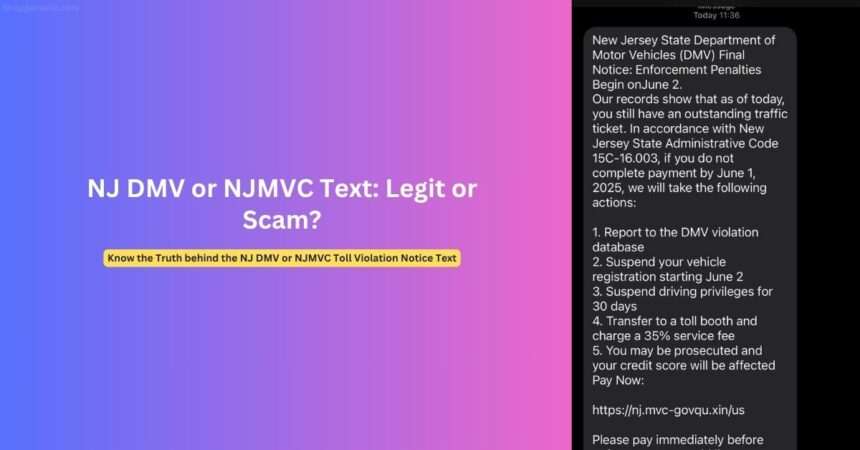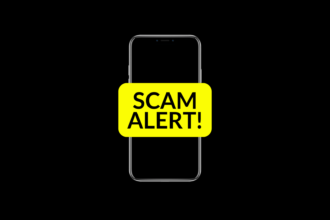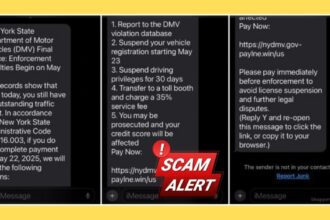A sophisticated text messaging scam is sweeping across New Jersey, targeting drivers with fraudulent messages claiming to be from the state’s Department of Motor Vehicles. These malicious texts threaten immediate consequences for alleged unpaid traffic tickets, creating panic and urgency designed to trick victims into revealing personal information or making fraudulent payments.
The New Jersey Motor Vehicle Commission (NJMVC) and cybersecurity authorities have issued urgent warnings as thousands of residents report receiving these deceptive messages. Understanding how these scams operate and recognizing the warning signs can protect you from becoming a victim of this growing threat.
Overview of the New Jersey (NJ) DMV or NJMVC Text Scam
The current wave of SMS phishing attacks, known as “SMiShing,” represents a coordinated effort by cybercriminals to exploit New Jersey residents. These scams have been reported across multiple states, with New Jersey being particularly targeted due to its dense population and high vehicle registration rates.
Key Statistics:
- Reports began surging in late May 2025
- Thousands of New Jersey residents affected
- Similar scams reported in Pennsylvania, New York, Illinois, Florida, and Georgia
- Messages sent from international phone numbers, primarily Philippines (+63 country code)
The scam exploits people’s natural anxiety about potential legal consequences and their unfamiliarity with how government agencies actually communicate. By creating false urgency and threatening severe penalties, scammers hope to bypass victims’ critical thinking and prompt immediate action.
How the NJDMV Text Scam Works
The scam follows a predictable pattern designed to maximize psychological pressure while appearing legitimate:
Step 1: Mass Distribution
Scammers send identical messages to thousands of phone numbers simultaneously, often using international calling services to avoid detection. The messages typically arrive during business hours to appear more official.
Step 2: Creating False Authority
The texts claim to come from the “New Jersey State Department of Motor Vehicles,” using official-sounding language and fake administrative codes to establish credibility.
Step 3: Generating Urgency
Messages include specific deadlines (often within 24-48 hours) and threaten severe consequences like license suspension, vehicle registration cancellation, and credit score damage.
Step 4: Directing to Fraudulent Websites
Victims are instructed to click malicious links leading to fake government websites designed to steal personal information, banking details, or payment card numbers.
Step 5: Data Harvesting
Once victims enter information on fraudulent sites, scammers collect sensitive data for identity theft, financial fraud, or resale on dark web markets.
Fake Text Message Patterns and Examples
Common Message Template
New Jersey State Department of Motor Vehicles (DMV) Final Notice:
Enforcement Penalties Begin on [DATE].
Our records show that as of today, you still have an outstanding
traffic ticket. In accordance with New Jersey State Administrative
Code 15C-16.003, if you do not complete payment by [DATE], we will
take the following actions:
1. Report to the DMV violation database
2. Suspend your vehicle registration starting [DATE]
3. Suspend driving privileges for 30 days
4. Transfer to a toll booth and charge a 35% service fee
5. You may be prosecuted and your credit score will be affected
Pay Now: [MALICIOUS LINK]
Please pay immediately before enforcement to avoid license
suspension and further legal disputes.
(Reply Y and re-open this message to click the link, or copy
it to your browser.)
Variations Observed
EZ-Pass Version: Messages claiming unpaid toll violations with threats of increased fees and collections actions.
Pennsylvania Variant: Similar structure but referencing “Pennsylvania Department of Transportation” with fake administrative codes.
New York Version: Uses “New York State Department of Motor Vehicles” with identical threat patterns.
Critical Red Flags to Identify Scam Texts
Immediate Warning Signs
| Red Flag | Why It’s Suspicious |
|---|---|
| Text Message Delivery | Government agencies send official notices by mail, never by text |
| Wrong Agency Name | New Jersey hasn’t had a “DMV” since 2003 – it’s now the Motor Vehicle Commission (MVC) |
| International Phone Numbers | Messages from +63 (Philippines) or other foreign country codes |
| Suspicious URLs | Links containing .xin, .win, or other non-.gov domains |
| Immediate Payment Demands | Real government notices provide reasonable time frames |
Language and Content Clues
- Grammatical errors: “onJune 2” instead of “on June 2”
- Nonsensical threats: “Transfer to a toll booth and charge 35% service fee”
- Fake legal codes: Using codes from other states (15C-16.003 is actually from Florida)
- Credit score threats: Traffic violations don’t directly affect credit scores
- Reply instructions: Legitimate agencies don’t ask you to “Reply Y” to access links
Technical Indicators
- Domain analysis: Real government sites use .gov, not .xin or .win
- URL structure: Legitimate sites follow standard government naming conventions
- Link manipulation: Requiring manual copying suggests attempts to bypass security filters
How to Protect Yourself from Fraudulent NJDMV Texts
Immediate Actions
Do Not:
- Click any links in suspicious texts
- Reply to the message
- Call phone numbers provided in the text
- Enter personal information on unfamiliar websites
- Forward the message to contacts
Do:
- Delete the message immediately
- Report as spam to your carrier
- Forward to 7726 (SPAM)
- Block the sender’s number
Verification Steps
- Check with official sources: Visit nj.gov or call the NJMVC directly at their published phone number
- Review your records: Log into your official MVC account to check for legitimate violations
- Examine recent mail: Real notices arrive by postal mail first
- Consult family: Discuss suspicious messages with trusted family members
Long-term Protection Strategies
Phone Security:
- Enable spam filtering on your device
- Never share your phone number unnecessarily
- Use carrier-provided scam protection services
Digital Literacy:
- Learn to identify government website characteristics
- Understand how legitimate agencies communicate
- Stay informed about current scam trends
Financial Protection:
- Monitor bank and credit card statements regularly
- Set up account alerts for unusual activity
- Consider credit monitoring services
What to Do If You’ve Been Targeted
If You Received the Text But Didn’t Click
- Delete the message without opening any links
- Report to authorities: File a complaint with the FTC at reportfraud.ftc.gov
- Alert others: Warn family and friends about the scam
- Document the incident: Screenshot the message before deleting for reporting purposes
If You Clicked the Link But Didn’t Enter Information
- Run security scans on your device
- Clear browser cache and cookies
- Update your antivirus software
- Monitor accounts for unusual activity
If You Entered Personal Information
- Contact your bank immediately to report potential fraud
- Change passwords on all important accounts
- Place fraud alerts on your credit reports
- File a police report at your local precinct
- Report identity theft to the FTC
If You Made a Payment
- Contact your bank or credit card company immediately
- Dispute the charges as fraudulent
- Request new payment cards if card information was compromised
- File reports with local police and the FBI’s Internet Crime Complaint Center
Official Agency Guidelines
New Jersey Motor Vehicle Commission (NJMVC) Policy
The NJMVC has clearly stated that they:
- Only send text messages for appointment reminders
- Never request payments via text message
- Always send official notices by postal mail
- Never threaten immediate enforcement via text
New Jersey Cybersecurity & Communications Integration Cell (NJCCIC) Recommendations
- Avoid clicking links in unsolicited text messages
- Visit official websites directly to verify account status
- Report SMiShing attempts to appropriate authorities
- Never submit sensitive information to unverified websites
Frequently Asked Questions (FAQs)
1. Is the New Jersey (NJ) DMV or NJMVC Final Notice text message legitimate?
No, these text messages are fraudulent scams. The New Jersey Motor Vehicle Commission (the state’s actual motor vehicle agency) does not send enforcement notices via text message. All legitimate communications come through postal mail. Additionally, New Jersey hasn’t had a “Department of Motor Vehicles” since 2003, making any text claiming to be from the “NJ DMV” automatically suspicious.
2. How can I verify if I actually have unpaid tickets or tolls?
To check for legitimate violations, visit the official New Jersey Motor Vehicle Commission website at nj.gov or log into your E-ZPass account directly. You can also call the NJMVC at their official phone number. Never use links provided in text messages to check your status, as these may lead to fraudulent websites designed to steal your information.
3. What should I do if I accidentally clicked the link in the scam text?
If you clicked the link but didn’t enter any personal information, immediately clear your browser cache and cookies, run a full antivirus scan on your device, and monitor your accounts for unusual activity. If you entered personal or financial information, contact your bank immediately, change your passwords, and consider placing fraud alerts on your credit reports.
4. Why are these scam texts so convincing?
These scams are designed to exploit psychological pressure by creating false urgency and using official-sounding language. They reference real-sounding administrative codes (though often from other states) and threaten consequences that people naturally want to avoid, such as license suspension or credit damage. The scammers hope this pressure will cause people to act quickly without carefully examining the message.
5. How do I report these scam text messages?
Report scam texts by forwarding them to 7726 (SPAM), filing a complaint with the Federal Trade Commission at reportfraud.ftc.gov, and reporting to the FBI’s Internet Crime Complaint Center at ic3.gov. You should also report the incident to the New Jersey Cybersecurity & Communications Integration Cell and your local police if you’ve suffered financial losses.
Conclusion
The New Jersey DMV text scam represents a serious threat to residents across the state, exploiting people’s concerns about potential legal consequences to steal personal information and money. By understanding the tactics used by scammers, recognizing the warning signs, and knowing how to respond appropriately, you can protect yourself and your family from these fraudulent schemes.
Remember that legitimate government agencies, including the New Jersey Motor Vehicle Commission, communicate through official channels and provide reasonable timeframes for addressing any issues. When in doubt, always verify suspicious communications through official websites or phone numbers, never through links provided in unsolicited messages.
The key to staying safe lies in remaining vigilant, educating yourself about current scam techniques, and sharing this knowledge with others in your community. By working together and staying informed, we can reduce the effectiveness of these criminal operations and protect our personal information from those who seek to exploit it.
Stay informed about the latest scam alerts and consumer protection tips with ShoppersVila.com – your trusted source for staying one step ahead of fraudsters and protecting your digital life.






































